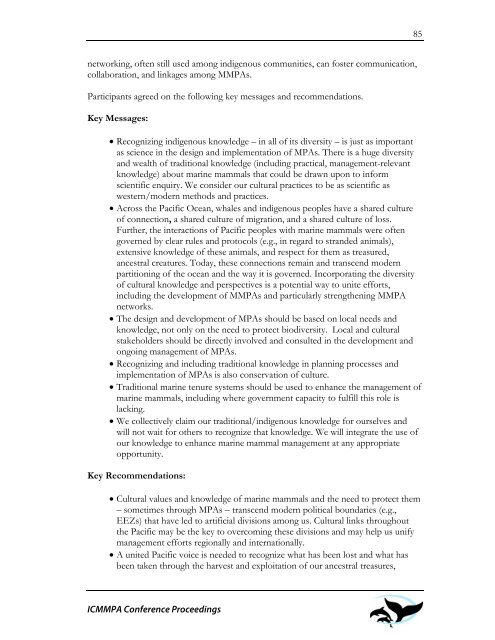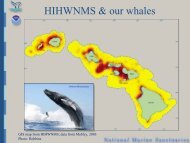The First International Conference on Marine Mammal Protected Areas
The First International Conference on Marine Mammal Protected Areas
The First International Conference on Marine Mammal Protected Areas
You also want an ePaper? Increase the reach of your titles
YUMPU automatically turns print PDFs into web optimized ePapers that Google loves.
networking, often still used am<strong>on</strong>g indigenous communities, can foster communicati<strong>on</strong>,<br />
collaborati<strong>on</strong>, and linkages am<strong>on</strong>g MMPAs.<br />
Participants agreed <strong>on</strong> the following key messages and recommendati<strong>on</strong>s.<br />
Key Messages:<br />
• Recognizing indigenous knowledge – in all of its diversity – is just as important<br />
as science in the design and implementati<strong>on</strong> of MPAs. <str<strong>on</strong>g>The</str<strong>on</strong>g>re is a huge diversity<br />
and wealth of traditi<strong>on</strong>al knowledge (including practical, management-relevant<br />
knowledge) about marine mammals that could be drawn up<strong>on</strong> to inform<br />
scientific enquiry. We c<strong>on</strong>sider our cultural practices to be as scientific as<br />
western/modern methods and practices.<br />
• Across the Pacific Ocean, whales and indigenous peoples have a shared culture<br />
of c<strong>on</strong>necti<strong>on</strong>, a shared culture of migrati<strong>on</strong>, and a shared culture of loss.<br />
Further, the interacti<strong>on</strong>s of Pacific peoples with marine mammals were often<br />
governed by clear rules and protocols (e.g., in regard to stranded animals),<br />
extensive knowledge of these animals, and respect for them as treasured,<br />
ancestral creatures. Today, these c<strong>on</strong>necti<strong>on</strong>s remain and transcend modern<br />
partiti<strong>on</strong>ing of the ocean and the way it is governed. Incorporating the diversity<br />
of cultural knowledge and perspectives is a potential way to unite efforts,<br />
including the development of MMPAs and particularly strengthening MMPA<br />
networks.<br />
• <str<strong>on</strong>g>The</str<strong>on</strong>g> design and development of MPAs should be based <strong>on</strong> local needs and<br />
knowledge, not <strong>on</strong>ly <strong>on</strong> the need to protect biodiversity. Local and cultural<br />
stakeholders should be directly involved and c<strong>on</strong>sulted in the development and<br />
<strong>on</strong>going management of MPAs.<br />
• Recognizing and including traditi<strong>on</strong>al knowledge in planning processes and<br />
implementati<strong>on</strong> of MPAs is also c<strong>on</strong>servati<strong>on</strong> of culture.<br />
• Traditi<strong>on</strong>al marine tenure systems should be used to enhance the management of<br />
marine mammals, including where government capacity to fulfill this role is<br />
lacking.<br />
• We collectively claim our traditi<strong>on</strong>al/indigenous knowledge for ourselves and<br />
will not wait for others to recognize that knowledge. We will integrate the use of<br />
our knowledge to enhance marine mammal management at any appropriate<br />
opportunity.<br />
Key Recommendati<strong>on</strong>s:<br />
• Cultural values and knowledge of marine mammals and the need to protect them<br />
– sometimes through MPAs – transcend modern political boundaries (e.g.,<br />
EEZs) that have led to artificial divisi<strong>on</strong>s am<strong>on</strong>g us. Cultural links throughout<br />
the Pacific may be the key to overcoming these divisi<strong>on</strong>s and may help us unify<br />
management efforts regi<strong>on</strong>ally and internati<strong>on</strong>ally.<br />
• A united Pacific voice is needed to recognize what has been lost and what has<br />
been taken through the harvest and exploitati<strong>on</strong> of our ancestral treasures,<br />
ICMMPA <str<strong>on</strong>g>C<strong>on</strong>ference</str<strong>on</strong>g> Proceedings<br />
85



